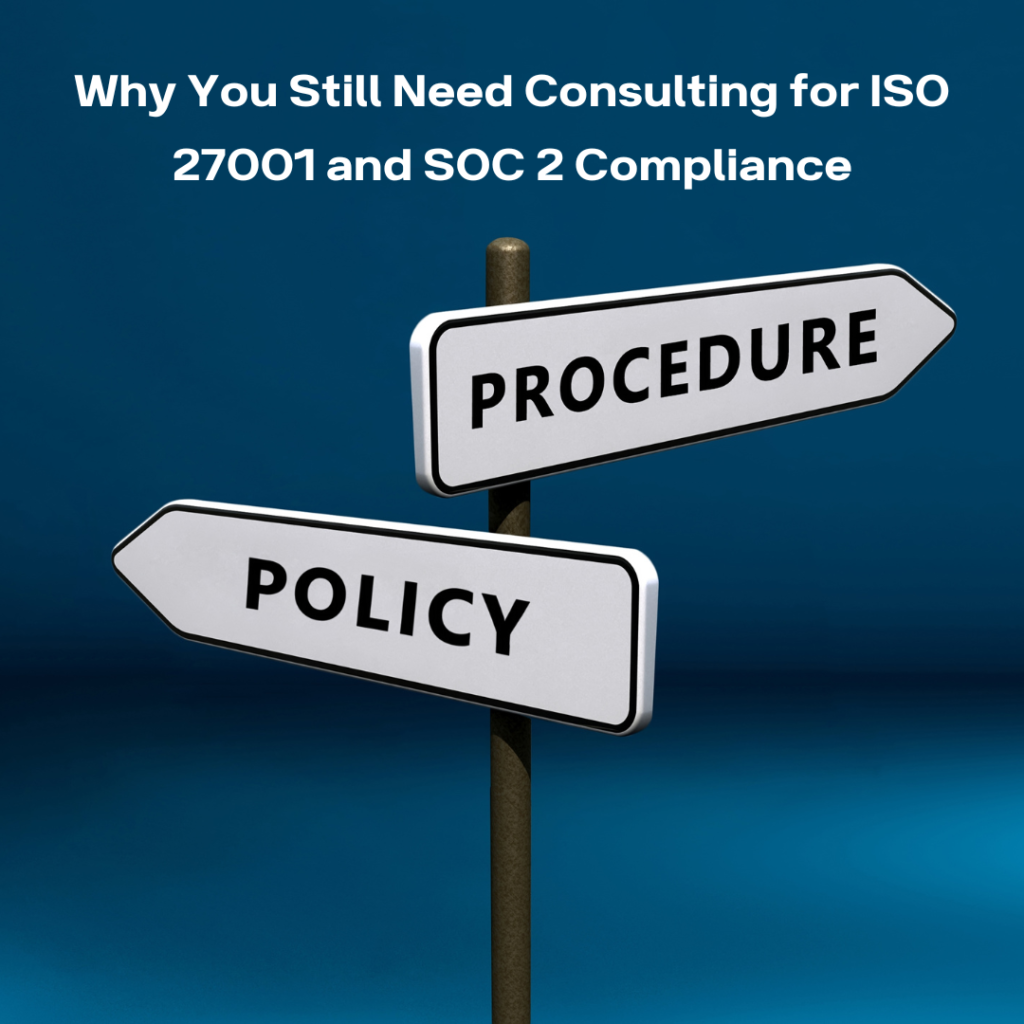Achieving compliance with standards like ISO 27001 and SOC 2 is no small feat. These certifications are vital for businesses that want to demonstrate their commitment to information security and data protection. But while you may have a capable internal team, working with consultants during your ISO 27001 or SOC 2 journey can significantly ease the process, reduce risks, and enhance the overall effectiveness of your security posture.Here’s why consulting is often still necessary when implementing ISO 27001 and/or SOC 2:
1. Specialized Expertise in Compliance FrameworksISO 27001 and SOC 2 are both robust frameworks, but they differ in scope, focus, and requirements. ISO 27001 is an international standard focusing on a wide range of information security management systems (ISMS), while SOC 2 centers on controls relevant to five key principles: security, availability, processing integrity, confidentiality, and privacy.Consultants who specialize in these standards bring deep expertise and experience across industries. They know how to interpret and apply the requirements, identify gaps in your current systems, and ensure that the certification process is efficient and effective. An expert consultant can tailor the frameworks to fit your business needs while ensuring you stay compliant.
2. Cost-Efficiency: Reducing the Risk of Delays and ReworkAlthough it may seem like an additional expense, hiring consultants can actually save your organization money in the long run. Compliance audits are rigorous, and failing an audit due to misunderstandings, incomplete documentation, or inadequate controls can be costly—both in terms of time and resources.Consultants help to streamline the process and reduce the chances of expensive mistakes. They’ll guide you on how to prepare effectively for the audit, ensuring all necessary controls are in place and well-documented. This foresight prevents costly rework or delays that can arise from audit findings or gaps discovered late in the process.
3. Objectivity and Unbiased AssessmentInternal teams, while familiar with their organization’s systems, may lack the objectivity needed for a thorough risk assessment or gap analysis. Consultants provide an unbiased, fresh set of eyes to help identify vulnerabilities that may be overlooked by those who are too close to the project.Their external perspective allows them to apply a broader, more comprehensive understanding of risks, based on best practices and knowledge gained from working with multiple clients across various industries. This objectivity is key when conducting risk assessments or validating controls, ensuring nothing slips through the cracks.
4. Customized Solutions to Fit Your Unique NeedsEvery organization is different, and a one-size-fits-all approach rarely works when it comes to security compliance. A consultant can help tailor ISO 27001 or SOC 2 controls to suit your company’s specific requirements and risk profile. They will help implement processes and technologies that align with your business goals and operational needs.For instance, they might guide your internal team in crafting policies and procedures that are not only compliant but also practical and sustainable for the day-to-day operation of your business.
5. Staying Ahead of Evolving RequirementsThe landscape of cybersecurity and compliance is ever-changing. New threats emerge, and standards are continuously updated to reflect the latest best practices in security. Keeping up with these changes can be challenging for an internal team that is focused on core business functions.Consultants stay up-to-date with the latest developments in compliance standards and cybersecurity regulations. They can help your organization stay compliant even as requirements evolve, preventing potential future non-compliance and helping to maintain certification over the long term.
6. Efficient Use of Internal ResourcesImplementing a compliance program like ISO 27001 or SOC 2 is resource-intensive. It requires considerable time, focus, and technical expertise, often pulling key personnel away from their day-to-day responsibilities. A consultant helps alleviate that burden by guiding your team, leading initiatives, and handling much of the heavy lifting, allowing your internal resources to stay focused on core business operations.Consultants can provide project management, assist in the development of necessary documentation, and help ensure timelines are met, keeping the compliance process running smoothly.
7. Improved Audit Readiness and Long-Term SupportISO 27001 and SOC 2 aren’t one-time certifications—they require ongoing commitment and maintenance. Consultants help set your organization up for success, not only in the initial audit but also for continued compliance.They assist in building sustainable information security management systems (ISMS) and internal controls that can be adapted and expanded as your organization grows. Their guidance ensures your systems evolve alongside regulatory requirements and industry best practices, reducing the risk of compliance failures in future audits.
Investing in Success
The complexities of achieving ISO 27001 or SOC 2 certification should not be underestimated. While your internal team may be skilled, partnering with experienced consultants brings an invaluable layer of expertise, objectivity, and efficiency that can make the difference between merely passing the audit and building a sustainable, future-proof security system.Consulting may seem like an optional investment at first glance, but the benefits—cost savings, reduced risk, and tailored guidance—far outweigh the costs. By leveraging specialized expertise, your organization can achieve certification more quickly, efficiently, and with greater long-term success.

